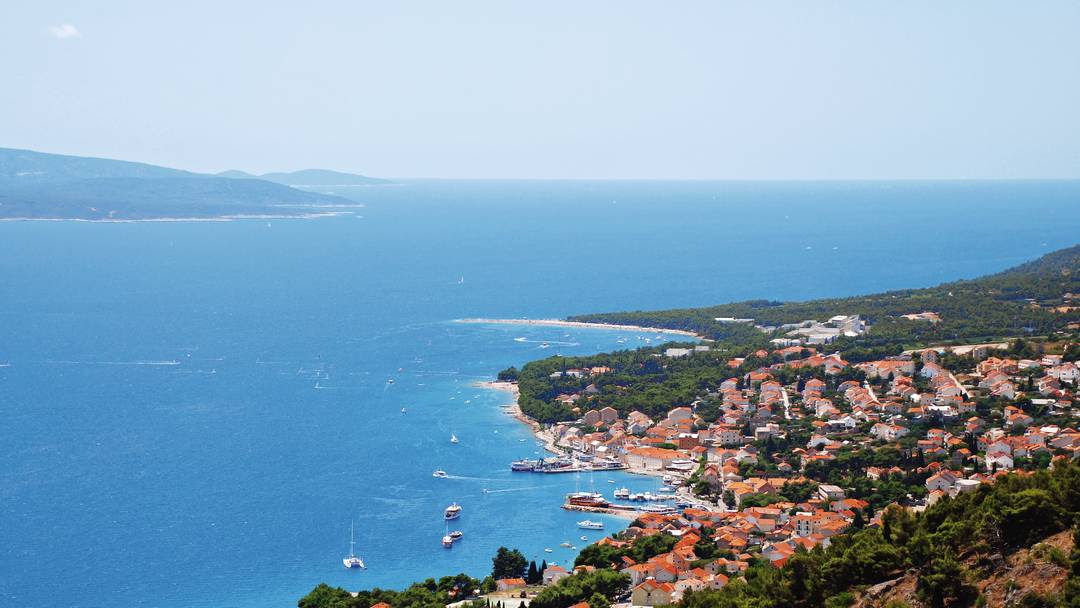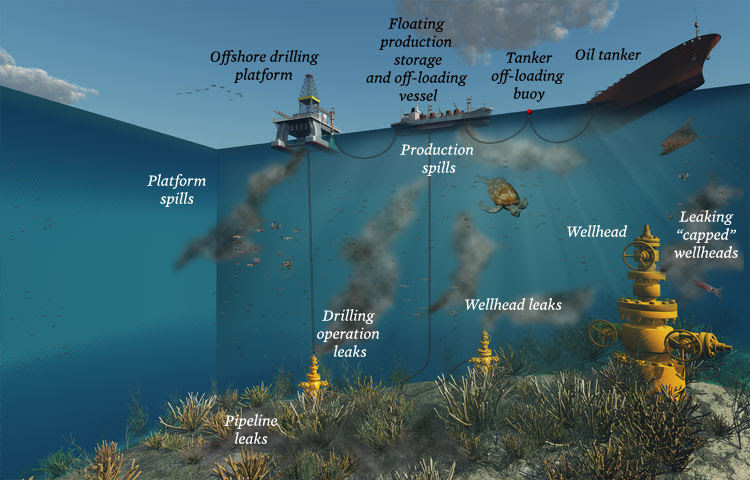Millions of tourists visit the beautiful Adriatic coast of Croatia every year and indeed are the ones to whom Croatian economy, no matter how deeply in tatters, owes much gratitude. However, the current government’s increasing acceleration and rush to get going with offshore drilling looking for oil and gas speaks of the government’s path to destroy one successful industry – tourism – in order to gamble with another: oil and gas production. The Croatian government keeps saying that there could be oil and gas deposits in its part of the Adriatic worth billions of Euro and, if so, these could turn Croatia into a major energy heavyweight country that could be crucial in reducing Europe’s reliance on Russian energy imports.
Few weeks ago the Croatian government awarded 10 licences for hydrocarbon exploration and drilling in the Adriatic to three consortia, which together paid some 100 million Kuna (13 million Euro) for their rights. US, Austrian, UK, Hungarian, Italian and Croatian companies involved in the bidding reportedly have until 2nd of April 2015 to sign their exploration and exploitation agreements.
As much as 3 billion barrels of oil equivalent reserves are believed to lay beneath the pristine seabeds along the Croatian waters in the Adriatic. This is held to be among the highest mix of underwater energy deposits in the European Union. It is, therefore, no surprise the failing and incompetent government of Croatia is now hurriedly pushing ahead to tap into this possible energy wealth and thus try and save its political hide in this election year. They may not find what they think is there, though. Tourism rakes in a fifth of Croatia’s 51 billion Euro total annual economic outputs and the grand scale of the government’s appetite for oil and gas does raise the worry about how any such relatively large-scale oil rush may affect the tourism industry. Indeed, there will be many a tourist who won’t choose to spend their holidays by the seaside looking at an ugly, enormous steel contraptions sticking up from the sea surface even if they may be a few kilometers away. And let’s not even mention potential spills from such contraptions.
Thousands of people, mostly living on Croatia’s coast, have signed a petition by the Clean Adriatic Sea Alliance, a group opposing the drilling. This is their plight:
“WHY OIL DRILLING IN THE ADRIATIC IS PROBLEMATIC • In case of any kind of accident, oil exploration and exploitation would endanger the entire Adriatic ecosystem, including all people whose livelihoods depend on tourism and fishing… • The Croatian Government keeps investing in old technologies in an era when there are clear alternatives to fossil fuels. According to a new report from the International Renewable Energy Agency (IRENA), the prices of renewable energy sources (RES) in 2014 were competitive with fossil fuel prices… • Oil drilling in the Adriatic threatens tourism, one of the most lucrative branches of the Croatian economy, which not only employs a large number of people, but also regularly contributes around 15% or more to the annual GDP. That makes it one of the few stable industries in Croatia. Drilling threatens fishing as well, an industry which employs many people throughout the year, especially in areas which don’t have many employment opportunities, such as islands and smaller coastal cities (Croatia exported about $114 million worth of top quality marine fish in 2003). • Even among the companies that are presented as “the best”, “most professional”, and “safest”, such as BP or Shell, catastrophic errors still happen… • The whole process of conducting the public tender, “passing” the Framework Plan and Program for the Exploration and Exploitation of Hydrocarbons in the Adriatic, and the preparation of the Strategic Environmental Impacts Assessment was nontransparent and rushed. The license for 2D seismic exploration of the Adriatic, which was conducted by the British company Spectrum Geo Ltd from September 2013 to January 2014, was issued by the Ministry of Economy after signing a secret contract, and without holding a public tender. The decision to award concessions for oil and gas exploration in the Adriatic was made on January 2nd 2015 in a closed government session, without any prior public debate or thematic session in the Parliament. The very fact that the whole process is run by just one ministry [of economy], and a hurriedly established Agency for Hydrocarbons, leaves room for corruption, and signing harmful contracts. These are only some of the reasons why we believe that the planned exploration and exploitation of oil in the Adriatic is unacceptable”.
Croatian officials dismiss safety concerns and say that rig operators will have to meet the strictest EU safety standards for offshore drilling.
Barbara Doric, president of the Croatian Hydrocarbon Agency, or AZU, said recently that The Gulf of Mexico [disaster] happened because of the lack of human surveillance and that they in Croatia have implemented the highest standards and controls for all operations.
It seems Doric can guarantee human surveillance to the level of absolute proof against disasters such as the Gulf of Mexico one – what a nut case! I will only take one spill and the damage to the tourism industry would be enormous.
But Croatia’s plans to become an energy hub in "the region" go further. The government wants to look for gas and oil onshore in the country’s northeast, build a liquefied natural gas terminal on the coast—planned to open in 2019—and transport gas from Azerbaijan via its overland pipeline network, Croatia’s economy minister Ivan Vrdoljak said recently.
Croatia has great resources and enormous potential for clean, renewable energy sources but nothing about that is coming from the government. So:
“The Croatian public deserves to know the facts when it comes to expanding this dirty and dangerous practice to the Adriatic Coast, and what alternatives there are for clean energy generation. Instead of working to fully understand the implications of rushing to develop offshore oil and gas, our elected officials are being blinded by imaginary short-term profits and missing the real opportunity that wind provides. In just 10 years, offshore wind could generate more energy than could be provided by all of the economically recoverable offshore oil and gas resources. Unlike offshore drilling, offshore wind provides power directly to coastal communities where we need energy the most, without the risk of oil spills or carbon pollution. It’s time for the Croatia to use the lessons learned from more than 20 years of offshore wind development internationally and apply them to generating clean, renewable energy off our coasts,” writes Zeljko Serdar of Croatian Center of Renewable Energy Sources (CCRES).
Italy has more than 100 platforms in the Mediterranean, on the other side from the Adriatic, but called a moratorium on future drilling in the 1990s because of environmental concerns. Some say that if Italy decided to drill its unexploited Adriatic deposits as well, that is, those that are within its maritime borders, it could double its national production level. But first it seems they’ll wait to see whether the natural gas and oil that Croatia hopes to find in the Adriatic turn out to be there: for the moment the proven deposits amount to only 70 million barrels of crude and less than 900 billion cubic meters of natural gas.
Listening to Croatia’s government representatives on the issue of offshore drilling fantasies of becoming a little Oslo on the Adriatic, Croatia the Norway of the south, are rife but this fantasy might prove more complex than expected. While one might argue that taking the risk of seeing whether riches really lie beneath the Adriatic seabed to try and salvage the economy is worthwhile one simply cannot take lightly the possible enormous damage exploitative offshore drilling could cause to the more lucrative tourism industry. Since it has rushed into this project, one also cannot but criticize the government for not taking the initiative of using funds from the sale of offshore drilling licences for the development of clean and sustainable energy supplies. Ina Vukic, Prof. (Zgb); B.A., M.A.Ps. (Syd)
Link of interest on the protest against drilling in the Adriatic |
يسوع المسيح هو الطريق والحق والحياة. وساقوا يسوع إلى رئيس الكهنة. فاجتمع إليه جميع رؤساء الكهنة والشيوخ والكتبة. وتبعه بطرس من بعيد إلى داخل دار رئيس الكهنة، وكان جالسا مع الحراس يستدفيء عند النار. وأخذ رؤساء الكهنة والمجلس الأعلى كله يبحثون عن شهادة على يسوع ليقتلوه، فلم يجدوا. فقد شهد كثيرون عليه زورا، ولكن شهاداتهم كانت متناقضة.
srijeda, 25. veljače 2015.
Croatia: Tourism And Ecosystems Fret As Offshore Drilling Rushed
Pretplati se na:
Objavi komentare (Atom)



Nema komentara:
Objavi komentar